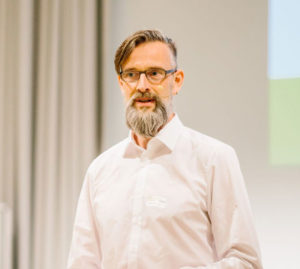Foreword by Dr. Andreas Zeuch

I first met Dominic via Twitter and then via Xing. In the course of our dialogue we began to deal with the current and pressing topic of “New Work”. In this context, Dominic wrote my last book “All Power for Nobody. Awakening of the Corporate Democrats “read and today he publishes the review here. In order for all of us to be successful in facing the challenges of a social transformation towards more participation, including in the world of work, closely interlinked cooperation and ongoing dialogue about the risks and opportunities of democratic work design are required. Today’s review is a step more in this direction, which I fully support and which of course delights me. You, dear readers, have fun with the following review.
Dr. Andreas Zeuch (* 1968) accompanies companies as a consultant, trainer and speaker on their way to more participation and corporate democracy. In addition to his books, Zeuch has published around 70 articles in specialist journals to date.
Democracy in Business?
“In our private life it is the rule to shape our own life. In contrast, most of the companies in the company have become accustomed to handing over their independent thinking and acting at the gate.” This is how the teaser for the book begins: All Power for Nobody by Dr. Andreas Zeuch. But what advantages can corporate democracy offer? After the feasibility of Democracy in companies has been examined, the potential of democracy will now be examined. For this purpose I have the publications of Dr. Andreas Zeuch identifies and gives a brief insight into his considerations.
Companies are challenged!
Why are companies challenged? What new events require us to include approaches such as democracy and the like in our considerations? Zeuch sees the business environment as the motivation for the idea of corporate democracy, which is much more dynamic and complex than ever before. Second, he lists the demands of Generation Y on employers. This means that, according to Zeuch, the following challenges arise:
- Decisions have to be made faster and more directly
- Innovations determine the future viability
- Leadership must create a framework in which inner motivation can develop freely.
- Co-determination and participation must be given in companies
Companies to have a say!
Zeuch criticizes the fact that formal hierarchies do not make decisions where they are necessary. Zeuch also claims in his book that decisions in democratic companies are faster and better. He therefore claims that a democratic decision is even faster and thus invalidates a prejudice against democracy. His consideration is as follows: Although it takes longer to find this decision, in contrast to a formal decision, it does not have to be communicated in an elaborate manner and everyone involved has to be “picked up and convinced”. Zeuch makes it clear that the implementation of joint decisions is more efficient and effective than lonely topdown decisions.
He also criticizes formal innovation management and “command and control” mechanisms. According to Zeuch, a particularly large number of ideas arise where employees are allowed to develop new products and prototype on their own, at least up to a certain budget. Bureaucratic corporations solve the innovation dilemma by either buying start-ups or starting up.
However, if employees are constantly being told what they have to do and what not to do, this will in the long run neither promote their creativity nor the will to contribute new ideas (Andreas Zeuch).
Does corporate democracy make companies more agile?
In summary, Zeuch sees the following problem: “Often there is also a lack of the necessary trust, instead there is a climate of mistrust, control and punishment”. Corporate democracy is supposed to change this dilemma. He wants employees to participate directly in the company through democracy and sees this as an opportunity to outsource management of the company directly to the interfaces between the market and customers.
The more people are involved in decisions, the more perspectives flow into it (Andreas Zeuch)
But when are companies actually democratic? How democratic does a company have to be in order to achieve the effects already mentioned? Zeuch divides democratic companies into 3 levels of maturity.
Weakly democratic are companies that allow their workforce to co-determine operational decisions, i.e. their own work.
Moderately democratic are companies that have a say in tactical decisions. These are decisions that go beyond your own work area and have a wider scope, such as hiring staff.
Strongly democratic are companies when, in addition to operational and tactical decisions, strategic decisions, i.e. fundamental, existential questions, are also determined by the employees.
So the possible effects occur with increasing democratization. Zeuch limits the fact that democracy does not automatically have to mean the end of hierarchy and leadership. So there can be managers who have been elected by the workforce for a limited period of time. I had a brief dialogue with Andreas Zeuch on this point and he made it clear that there MUST be leadership and that hierarchies are automatically set up if you try to abolish them. His key message is the distinction between formal, fixed hierarchies and dynamic leadership. On the other hand, executive elections are just one variety, according to Zeuch. There can also be rotating systems, or employees can propose themselves as managers and are then accepted – but do not always have to be formally elected.
Overall, Andreas Zeuch’s considerations and arguments promote the agile principles of research in modern and sustainable companies. The core of the book is made up of many case studies and interviews on the subject of corporate democracy. So it shows that Zeuch’s considerations apply and can offer companies added value. In addition to the round tables, a Bachelor thesis on this topic .
[werbung] Verwendete Quellen anzeigen



